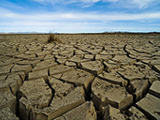So Much Hot Air: Climate Change After the US Election
7 Dec 2016
By Paul Rogers for Oxford Research Group (ORG)
This article was external pageoriginally publishedcall_made by the external pageOxford Research Group (ORG)call_made on 30 November 2016.
Summary
Whether or not he believes his own campaign rhetoric, the election of Donald Trump to the US presidency is bad news for efforts to enforce climate governance and restrain carbon emissions. Yet the global mood is one of determination in the face of US obstinacy, buoyed by technological advances in green energy generation and storage and by the increasingly apparent commercial opportunities presented by a transition away from fossil fuels. Ignoring such potential will likely damage not only the US’ global reputation, but also its economy.
Introduction
In May of this year, ORG published a briefing external pageClimate Change: Prospects for Effective Future Actioncall_madewhich followed an earlier report in March 2014, external pageResponding to Climate Disruption – Developing the Agendacall_made. The May briefing concluded:
“Perhaps it is a regrettable reflection of current world politics that much will depend on the outcome of the US Presidential Election later this year. The George W. Bush presidency from 2001 to 2009 was a period of climate change denial which did great damage to world responses to the problem. The 2009-17 Obama administration has been rather better, although heavily constrained by domestic politics, especially the majority attitude of both Houses of Congress. If the 2016 election is fought by Hillary Clinton and Donald Trump, then the former is unlikely to reverse the modest gains of the Obama era but Mr Trump has made it abundantly clear that he would wish to withdraw from the Paris agreement and accelerate the domestic production of fossil fuels. In terms of prospects for a serious global change in attitude to climate change, much will depend on the result of the election.”
Given the outcome of the US Presidential Election, it is appropriate to return to the theme and discuss how “much will depend on the outcome”.
Context
The May 2016 briefing summarised ORG’s overall analysis of global security problems focusing on the interaction between socio-economic marginalisation, resource competition, climate change and global militarisation. In this context, the earlier 2014 briefing, published a few months before the Paris climate change summit, assessed the situation thus:
“Recent examples of short-term climate disruption have done much to bring the overall issue of climate change up the political agenda. In responding to what will be one of the key challenges of the next decades – well beyond the 15-year lifetime of the post-2015 global development goals currently under discussion – much of the attention has been focused on the need to adapt to those elements of climate change that are already irreversible and also to the need to decarbonise existing high carbon-emitting economies. What needs much greater attention is the fundamental need to ensure that low-carbon emitters in the Global South are enabled to combine effective human development with responding to the challenges of climate change.”
That briefing was written five years after the Copenhagen climate summit meeting, COP 15 (15th Conference of Parties to the Convention), in December 2009, which was widely regarded as a failure. By 2014, however, the realities of climate change were so apparent that there was a genuine hope that COP 21 in Paris in late 2015 would see a substantial change both in attitude and commitment of many countries. That was indeed what happened and much of the agreement was due to be finalised in more detail at COP 22, a twelve-day event in Marrakesh, which started on 7 November in the immediate wake of the US election.
The Trump Era
President-Elect Trump’s election campaign has been described as a bundle of inconsistencies but the relatively brief mentions of climate change pointed to this being one issue of relative consistency, with Trump seeing climate change as something of a conspiracy, planning to withdraw from the Paris accords and to prioritise the domestic production of coal, oil and gas. It is not clear whether Mr Trump will maintain this singularly stronger anti-climate change stance - there have been some indications of a softening of some of the campaign rhetoric, but some of Mr Trump’s appointees appear particularly conservative in their views on the issue.
As President he will have many opportunities to limit a number of Barack Obama’s environmental initiatives, including cutting the funding for the Environmental Protection Agency, fulfilling his campaign pledge to kill the Clean Power Bill or reversing support for UN initiatives to curb the impact of air travel. He can also influence the Office of Information and Regulatory Affairs to slow down the implementation of previously agreed measures. Furthermore, and in perhaps the most significant sign of intentions, there are reliably-sourced indications that an early decision will be taken to cease funding NASA’s important programme of climate-related research.
This is, regrettably, the strongest indication that Trump will maintain his pre-election stance on this issue and will be at least as tough as George W Bush, implying that the next four years will see not just an absence of US-leadership on preventing climate change but a markedly antagonistic outlook. In such pessimistic circumstances does this mean that the world community as a whole is far less likely to rise to the challenge presented by what is increasingly being called “climate disruption” rather than the more neutral term “climate change”? That may not be the case as there are three indications that even a Trump era may not be as disastrous as feared.
The Mood in Marrakesh
COP 22 was held just after Trump‘s election victory which might have been expected to cast a shadow over the whole meeting. There was a particular concern that some countries with governments that may be privately unsympathetic to the COP 22 aims might use the result to backtrack on their previous commitments. In the event, that did not happen and the mood was more one of Trump’s victory reinforcing the determination of a number of states to maintain the recent rate of progress.
One of the most significant developments relates to a question of timing – the Paris accords have entered into force and if he seeks to withdraw the United States from them he will face very strong public pressure which may this time include some Republicans. The problems of climate change loom much larger than in 2001 when Bush withdrew from the Kyoto accords and a Trump presidency will be far more isolated on the international stage.
Technology and Opportunity
Over the past decade there have been many technical developments in renewable energy utilisation and storage, with substantial increases in research and development of new systems. In many parts of the world, new turbine technology has brought wind power costs down to and even below grid parity (equivalent to the price of electricity generated from fossil fuels) and one of the results of this is that it is becoming commercially viable to develop such systems without the need for state-level support.
This is becoming true for solar power, especially photovoltaic (PV) utilisation, where costs have fallen dramatically, even within just the past five years. There is also considerable research being undertaken on new PV systems, especially those based on perovskites, and the rate at which improvements in efficiency is happening is much faster than with the earlier experience with silicon-based systems. There is also considerable investment being applied to a range of storage technologies, as well as economies of scale as larger production facilities come online.
It remains the case that the transition to renewables could be very much faster if more short-term fiscal incentives were available to kick-start the uptake of new technologies but what has changed is that renewable energy systems are now becoming attractive areas for free-standing investment. In such circumstances, and in an area of strong international competition, even a Trump administration will not be able to ignore this.
If it does, and chooses to follow through on campaign pledges to bolster dependence on fossil fuels, and coal in particular, it risks not only amplifying climate disruption but losing out on major business and industrial opportunities in cutting edge technologies. Ironically, such a situation might replicate Mid-West America’s failure to respond to Japanese and European advances in automotive design and efficiency after the oil price shocks of the 1970s and thus exacerbate the structural decline of industries in the alienated rust belt states where Trump built his victory.
Climate Trends
As the May briefing pointed out, it is now well-nigh certain that 2016 will exceed 2015 as the warmest year recorded since accurate measurements were available around a century ago. 2015 was, in turn, warmer than the previous record year, 2014, and the increases in 2015 and 2016 were each unusually high compared with previous experience.
Many other records from across the world support the view that we may already have entered an era of substantial climate disruption and there is growing evidence that some of the most intractable conflicts have been made worse by the existing impact of climate change.
Perhaps most significant of all has been the recent experience of highly unusual weather patterns in the Arctic which have happened, ironically, in the immediate aftermath of the US Presidential Election. In the normal way, a relatively stable high-speed wind pattern around the Arctic provides a degree of separation between cold Arctic air and the much warmer air of more southern regions. It has now been reported that this pattern recently broke down for several weeks, with cold air spilling down across eastern Asia resulting in exceptionally low temperatures, while warm air was sucked up towards the Arctic leading to temperatures around 20˚C above those normally experienced at this time of year. This led to the remarkable situation of sea ice melting at precisely the time that it should be experiencing the onset of sustained winter freezing.
The Arctic region itself is warming faster than most of the rest of the planet and it is thought likely that climate change is also at least in part responsible for these recent events. This is, in short, another indicator of the manner in which the global climate is changing – climate disruption is not a problem for the future, it is happening now and that is becoming far more widely recognised.
Conclusion - Surviving Trump
These three elements, the absence of failure at COP 22, the sheer rate of technical change and the actual experience of climate disruption, all counter the potential impact of Trump, but do not diminish in any way the need for vigorous campaigning on the issue, especially as even the Paris accords are insufficient if we are to prevent hugely damaging climate disruption.
This does not mean that a Trump presidency is not a problem. His administration will come to power with the Republican Party controlling both Houses of Congress and if he does indeed maintain his negative attitude to climate change then this will mean a major setback for the necessary global response. At the same time, there is a subtle change under way in world-wide attitudes that are seen in many countries across the Global South, not least in China. Much of the Trump mantra is about “Making America Great Again” but what we just might witness is that on this crucial issue it may actually be the United States that gets left behind.
About the Author
external pagePaul Rogerscall_made is Global Security Consultant to Oxford Research Group and Professor of Peace Studies at the University of Bradford. His ‘external pageMonthly Global Security Briefings’call_made are available from our website. His new book Irregular War: ISIS and the New Threats from the Margins will be published by I B Tauris in June 2016.
For more information on issues and events that shape our world, please visit the CSS Blog Network or browse our Digital Library.


